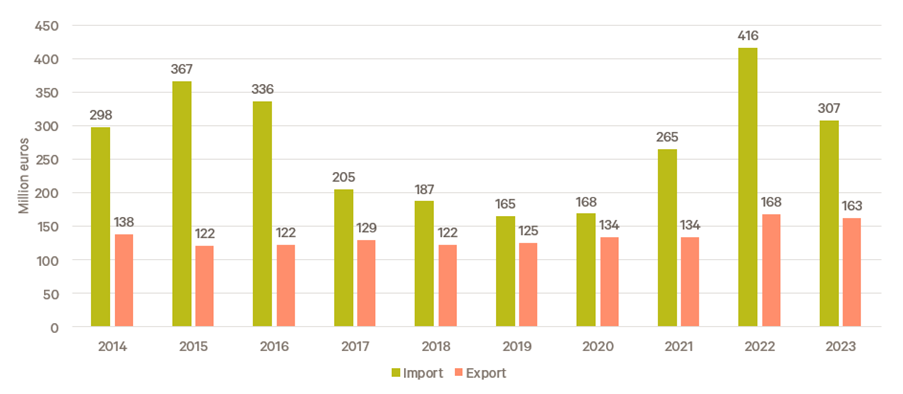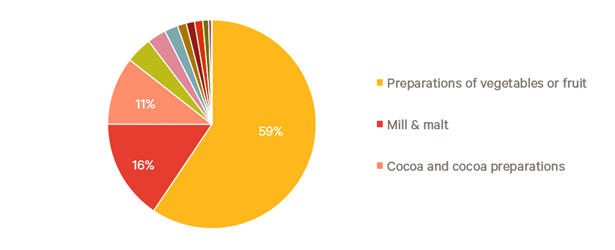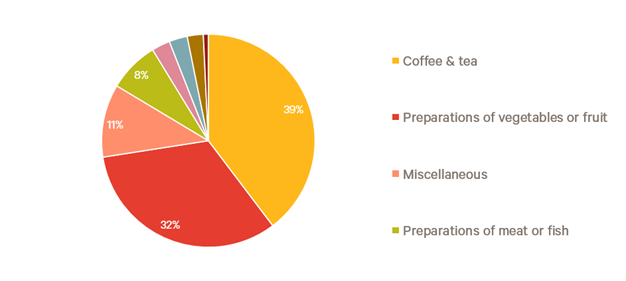Brazil is the most important sales market in Latin America for Belgian food and beverages. However, the country is particularly crucial as a supplier of basic products for the Belgian and European food industry, such as coffee beans and orange juice. During the Belgian Economic Mission to Brazil, food and logistics companies strengthen their trade flows and prove that although Belgium is a small country, it is big on food. It’s there that world leaders AB InBev and Puratos are developing the food of the future, such as alcohol-free beer and vegan bakery products.
Most important export market of Latin America...
The Belgian Economic Mission arrives at a perfect moment for Belgian food companies, as export to Latin America’s largest sales market have been increasing in recent years. From 23rd to 30th November, our food companies will boost that trend. Potato products as well as processed fruit and vegetables are our main export products, with Belgian fries in first place. Brazil is the second largest overseas export market after the US when it comes to potato products. In second place are milling products and malt, followed by chocolate (products).


... but import takes precedence
Whereas our export figures have been growing since 2018, import of Brazilian basic products continues to be more significant. Brazil is thus an interesting sales market, but is especially important as a supplier of basic products for the Belgian food industry. Covering 11% of our total imports, Brazil is our main overseas importing country.
As the largest coffee producer in the world, Brazil plays a key role in the global coffee market. Coffee beans therefore account for almost 40% of total imports. The beans are stored in the Port of Antwerp, the world's largest coffee storage facility, and are from there traded across the European market. Up to 40% of the beans in the Port of Antwerp are of Brazilian origin. The country is thus a vital supplier of raw materials for the over 60 Belgian coffee roasters being member of Fevia.
Orange juice is the second most common import product. Brazil is the largest producer of orange juice in the world. Two of the three global leaders in the orange juice trade, Louis Deyfus Company and the Brazilian Citrosuco, own a terminal in the Port of Ghent. From there, the juice is distributed to beverage producers in Belgium and Europe. So, you could say that nearly all the fruit juice consumed in Europe, have travelled through Ghent.

A sustainable trade relationship
Sustainability prevails in the Belgian-Brazilian trade relationship. This was demonstrated by Fevia, VLAM and the ports of Antwerp-Zeebrugge and Ghent during an event on food and logistics in São Paulo. The Brazilian trade association for coffee bean exporters, Cecafé, highlights the sector's significant efforts towards social and environmental sustainability. It does so through certifications, training for farmers and the integration of sustainable practices in the production chain. This way, producers focus on regenerative agriculture, organic crop protection, sustainable water management and origin transparency.
Fevia member Belmoca is one of the buyers of Brazilian green beans. During the event, this Belgian producer of coffee capsules will explain how sustainability is their priority as well. The company exclusively uses coffee beans, which are grown in a responsible and environmentally friendly way, whereby farmers are guaranteed a fair price. Belmoca produces recyclable, compostable and refillable coffee capsules and contributes to consumer awareness on responsible consumption and recycling.
Belgian and Brazilian partners also work together on CO2 emission reduction. North Sea Port, Louis Dreyfus Company and Citrosuco have the ambition to build a ‘green corridor’ between the ports of Ghent and Santos. Specifically, they are examining the construction of quay infrastructure to provide shore power supply for vessels. This would allow vessels to run on green electricity while loading and unloading orange juice.
Partners in innovation
Belgium and Brazil are also partners when it comes to innovation for food and beverages. Two Fevia members will demonstrate this to HRH Princess Astrid and the Belgian and Brazilian officials during the mission.
Puratos has already been working with Brazil for 35 years. Its ‘InSPiration Centre’ in São Paulo grew into an important part of the global network of innovation centres of this world leader in the bakery, pastry and chocolate industry. The centre conducts research and inspires professionals from across whole South America on iconic regional flavours and ingredients, such as tropical fruits and Brazil's famous rapadura, or raw sugar. The centre also develops healthier cakes, pastries and breads that are plant-based and vegan. Finally, Puratos also reinforces the local community with its bakery school in the suburb of Guarulhos.
Brazil has the largest beer market in Latin America. Belgian Interbrew merged with the Brazilian AmBev now twenty years ago. Innovation centres in Leuven and Rio de Janeiro work together on alcohol-free beer, one of the fastest-growing segments in the global beer industry. Different product technologies and brewing methods are tested at the centre to improve alcohol leaching without sacrificing taste or texture. The ‘Smart Drinking Lab’ at the university campus in Rio encourages responsible alcohol consumption through data analysis, innovative applications, and by raising awareness among its consumers.

